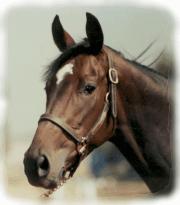A Horse, of Course with Don Blazer |
If you enjoy learning about horses, then you'll love our online courses. Each month you'll find a new column on our web site. We hope you'll enjoy it, and maybe e-mail us with questions or suggestions for other columns. A Horse, Of Course is a monthly column syndicated by Success Is Easy. If you like the column, call your local newspaper, or local horse publication and ask them to subscribe by contacting Success Is Easy. |
Barn Manager Wanted Don Blazer copyright©2011 The idea you can't make a living working in the horse industry seems to be widely held. But survey results show the idea may be invalid. A forum chat had the father of a college student warning everyone to study anything but equine science. His premise was "major in anything that can get you a job that pays well, offers health insurance and a pension." He gave no consideration to what a person loves to do, or is naturally qualified to do. He would have you toil in a job you didn't like so that when you got "sick of it" your prescription drugs would be covered. And he apparently gave no consideration to the current "depression" turned "recession" in which thousands lost their jobs, their health benefits, their pension and too frequently their homes. And obviously he gives no consideration to the advice of the most successful on how to be successful: "Do what you love to do." But what really invalids the mistaken idea you can't make a living in the horse industry is the input of "potential employers" who can't find "qualified employees". A show horse trainer in California told me she'd love to hire a "qualified person" to manage her barn. "I've been in business for 30 years and I've yet to have a person with an equine degree apply for a job," she said. "It would be great for my business to have a really qualified person running my barn. I'd be happy to pay them a very good salary." As it is, she says, she has to supervise all the work at the barn. (She has 40 world class show horses in training). I can't rely on a stable manager to know health care or how to determine and adjust nutrition requirements or look for safety hazards or supervise grooms or talk with my clients on a knowledgeable level. "I have to be the qualified person, or I have to leave one of my assistant trainers when I go off to a show or for other business," she laments "It all takes time and it reduces the effectiveness of my business, not to mention that it's costing me potential profit." According to this trainer, most trainers have to hire help at lower salaries because they have to "teach the person the job requirements." "You can't pay a person top dollar, when their knowledge is entry level." She explains that most who seek employment are simply "horse lovers who think they know a lot, but who offer no real skills or knowledge which can enhance my business." "I hire a lot of young women to work at grooming and providing daily ground exercise for my horses. I don't pay them much because most of them start out not knowing how to properly halter a horse let alone how to properly groom one. We have to teach them, and that takes our time. And about the time we get them trained they find a job in another barn that pays more, because now they at least have some basic knowledge." In surveying feed companies, tack and equipment retailers, breeding farms, veterinarians, magazine editors, and other trainers, the lack of qualified prospects was constantly near the top of the list as to why good paying jobs were not available. One veterinarian said, "I want an assistant I can introduce to clients as an equine study graduate. That gives my clients confidence in my assistant, in me, and in our company. Why do you think we hang a diploma on the office wall…..it tells the client we're qualified to treat their horses." A lack of good paying jobs within the horse industry may be a myth. The truth may be there is a lack of qualified persons to fill the good paying jobs waiting to be filled. |
